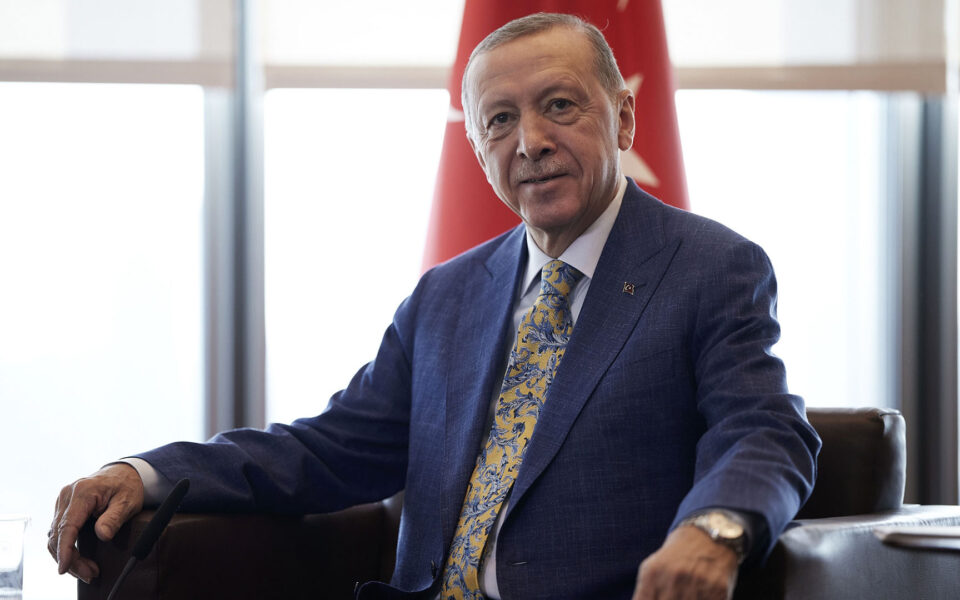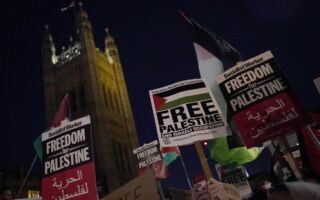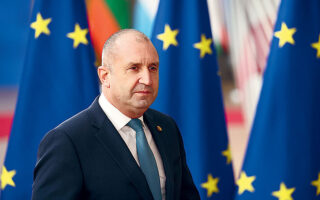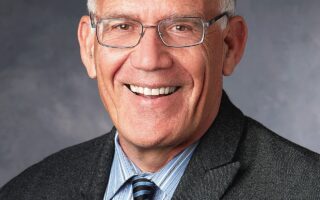‘My friend Kyriakos, we don’t threaten you, if you don’t threaten us’
In an exclusive interview with Kathimerini, the Turkish president says ‘no issue should be left unaddressed’ in a possible appeal to the ICJ

In an exclusive interview with Kathimerini, 24 hours prior to his scheduled arrival in Athens, Turkish President Recep Tayyip Erdogan addressed a range of issues concerning Greek-Turkish relations, highlighting his vision for a “new page” in bilateral ties based on a “win-win” formula.
“My friend Kyriakos, we don’t threaten you, if you don’t threaten us,” is the message Erdogan says he will convey to the Greek prime minister during their meeting on Thursday, emphasizing that “no challenge is insurmountable through dialogue grounded in mutual goodwill.”
Regarding the prospect of reaching an agreement on referring the continental shelf issue to the International Court of Justice, Erdogan expresses the opinion that any potential appeal should encompass additional matters.
“There are many interconnected problems that need to be solved in addition to the continental shelf. We have to address them comprehensively,” he asserts.
Erdogan also clarifies that his statement “We may come one night suddenly” pertains to “terrorist elements endangering our country’s security.” He furthermore underscores that “the structural integrity of the Hagia Sophia Mosque will not be materially or spiritually damaged” and that “the artworks and all forms of art will not be diminished but protected.”
The English text of the written question-and-answer interview is a direct translation of the original document provided by the Office of the President of the Republic of Turkey.
Mr President, you recently talked about a “new page” in Turkish-Greek relations and a “win-win” formula for addressing differences. What exactly do you mean by that?
Greece is our neighbor and we will continue to be neighbors. We have a common geography and share the same sea. We breathe the same air. We are interconnected by our past. Unresolved issues persist between us. Both our countries acknowledge this reality. However, it depends on us whether we will allow these issues to cause tensions and disagreements between our governments and our people. It is within this context that I have talked about a “new page” in our relations and a “win-win” principle. This principle is intrinsic to Turkey’s approach to international relations and diplomacy. By smoothly addressing differences through dialogue and finding common ground, we can all reap the benefits. Recently, we have gained positive momentum in shaping our relations with Greece within this framework. Dormant bilateral mechanisms have been rekindled. Channels of dialogue are open and operate across all levels. Reciprocal visits are frequent. Guided by mutual trust, we are poised to enhance cooperation in areas pivotal to our countries and the broader region. The responsibility now rests on both parties to solidify, institutionalize, and promote this understanding. I believe Mr Mitsotakis shares the same willingness. The Declaration of Friendly Relations and Good-Neighborly Cooperation, which we hope to sign in Athens on December 7, will also clearly formalize this mutual intent.
The two countries experienced a period of heightened tension, nearly reaching the brink of military conflict in 2020. Both you and Prime Minister Mitsotakis were in office then, as you are now. What has changed? What will you tell Mitsotakis during your meeting in Athens?
You asked what has changed. From our perspective, nothing has changed. We have never seen Greece as an enemy or a rival. Like any nation, we seek friends rather than foes. I often emphasize our belief that any issues with our neighbors, especially Greece, can be surmounted. Recent change, in our view, stems from a revised Greek perspective toward us. Greece appears to understand that we are a nation receptive to extending the hand of friendship. Just as we have consistently responded resolutely to those who threaten our people’s security, territorial integrity, and national interests, we remain open to fostering cooperation and friendship. I believe Mr Mitsotakis understands this and sees that we sincerely wish to overcome the problems between Greece and Turkey and to further develop our relations. I also notice a similar approach in him and that is pleasing. You asked what I would say to Mitsotakis. I will tell him this: My friend Kyriakos, we don’t threaten you, if you don’t threaten us. Let us strengthen the trust between our countries. Let us enhance our cooperation across sectors – in the economy, trade, transportation, energy, health, technology, education, and youth affairs. Let us mutually safeguard the historical and cultural heritage of our nations. Whether addressing Aegean issues, collaborating against illegal immigration, or resolving ongoing problems related to the Turkish minority in Greece, no challenge is insurmountable through dialogue grounded in mutual goodwill. First of all, our peoples have staunchly supported both governments in this year’s elections, empowering us and Mr Mitsotakis to take robust and constructive steps forward.
Do you believe that Turkey and Greece can agree on referring the issue of the continental shelf to the International Court of Justice? How can we guarantee the ongoing calmness in the Aegean Sea, even if the fundamental issues are not addressed in the immediate future?
As I said, I believe that the problems will be resolved in the context of dialogue and goodwill. Of course, there are many interconnected problems that need to be solved in addition to the continental shelf. We have to address them comprehensively. A selective approach would be wrong. We cannot focus on some issues while neglecting others. Because they are all interconnected. When seeking international justice, no issue should be left unaddressed. Above all, we must boldly discuss all problems and guide public opinion accurately. The decisive factor lies in our commitment to resolving these issues. Our determination is unwavering. When observing our efforts to resolve conflicts in our surroundings and our ability to maintain diplomatic composure, you can perceive Turkey’s perspective and its capability to address issues peacefully. Our sincerity and our call are unambiguous. I believe that if Greece adopts a similar approach, free from external interference, we can embark on a positive trajectory toward building a peaceful future for our nations.
The statement you repeatedly made, “We may come one night suddenly,” has instilled a sense of threat among many Greeks. How would you address their concerns about whether this statement remains valid?
As I just mentioned, only those who threaten us should fear us. We stated that we would act swiftly against terrorist elements endangering our country’s security, and we have done what was necessary. We destroyed and will destroy the hotbeds of terrorism. That has consistently been our response to those challenging our territorial integrity, unity and cohesion, and that is not about to change. Safeguarding our homeland and ensuring the peace of our nation is an inherent right, and there should be no doubt that we will fully exercise this right against any terrorist centers.
Greece is not our enemy, but a valuable member of the alliance we are part of. Moreover, we are neighbors, we will remain neighbors, and we must mutually respect each other’s rights and vital interests. The Greek people, with whom we have coexisted for centuries, understand well how affectionate we can be when extending the hand of friendship. They are well aware of the acceptance and sincerity ingrained in our culture. We want to strengthen our relations based on mutual understanding and to live peacefully in this geographical region. We are a nation that has consistently demonstrated that our words are not uttered without purpose. The Western media try to distort my words.
Do you believe that there are energy reserves in the Aegean and the Eastern Mediterranean? How can exploration be carried out if the two countries cannot agree on the delimitation of the continental shelf?
Determining whether there are energy reserves relies on scientific research rather than my personal opinion. Promising studies on this matter have been conducted and continue to be carried out, as we can see. The Mediterranean and the Aegean are basins rich in natural resources. In the current international context, ensuring and maintaining energy security from a strategic point of view has become a key issue. In this sense, there are possibilities and opportunities for collaboration, particularly in the Mediterranean. Assessing the potential of such cooperation can contribute not only to the energy security of the countries in the region but also to the resolution of political issues. However, attempts to politically exploit these potentials pose the risk of ineffective resource utilization. We believe that energy is an element of cooperation and common benefit between all countries and societies and we want to resolve differences through dialogue. We prefer cooperation and we are ready for it. Hence, I have twice proposed organizing a comprehensive conference on Eastern Mediterranean opportunities. Unfortunately, the EU initially remained silent on this proposal. Silence does not solve problems. Similarly, the Turkish Republic of Northern Cyprus had proposed a joint processing of reserves and revenue distribution until a comprehensive solution was reached on the island. We support this proposal. While other countries in the region are also moving in this direction, why shouldn’t the two sides on the island cooperate? There are numerous issues in the Aegean on which we can collaborate. They are all aimed at fostering peace and prosperity for present and future generations.
The conversion of Hagia Sophia into a mosque has left many in Greece and the West in shock. What led to this decision, and is there a plan to reopen the Halki Theological School soon?
I would like to emphasize that the Republic of Turkey, founded on the principles of accepting and embracing diverse cultures, is essentially maintaining a system that carries both the institutions of the endowments and the rights and legislation concerning them into the future. The endowment system to which the Hagia Sophia Mosque belongs is still in effect today. The usage of the Hagia Sophia Mosque, under the Fatih Sultan Mehmet Foundation, aligns with its dedicated purpose, as affirmed by the Council of State’s decision. In the Founding Act, which serves as the statute of the Hagia Sophia Foundation, and which like any foundation, enjoys the privilege of immunity, it is guaranteed that the structural integrity of the Hagia Sophia Mosque will not be materially or spiritually damaged and that the artworks and all forms of art will not be diminished but protected. We are safeguarding this distinguished temple with diligence and respect rarely observed in human history, providing the opportunity for all of humanity to benefit materially and spiritually from this magnificent monument. The implementation and preservation efforts of the past 570 years are evidence of our country’s meticulous approach to the matter throughout history. We have initiated extensive works on the Hagia Sophia Grand Mosque, following the restoration carried out during the era of Mimar Sinan. As a symbol of peace and acceptance, the Hagia Sophia Mosque will continue to be open to visitors of all religions and beliefs.
Regarding the Halki Theological School, all private higher educational institutions in our country were nationalized in 1971 by a decision of our Constitutional Court. This decision applies not only to the Theological School but to all private higher educational institutions in our country. As there was no official institution of higher education to which the Theological School could be transferred, it had no legal status and its activities ceased. Today the reopening of the Halki Theological School is possible only through comprehensive legislative changes. On the other hand, the Patriarchate of Fener was not in favor of resuming the School’s education under the auspices of a state university subject to the legislation of the Council of Higher Education.
The migration flows in the Aegean have been a contentious issue for many years. Can the two countries cooperate directly to address and control this problem? Can the EU play a role?
We are witnessing a significant rise in migration movements around the world driven by both political instability and various concerns. Unfortunately, criminal structures are taking advantage of these situations to profit from people’s desperation, leading to substantial gains. As we have always said, this situation is not an issue that countries can overcome on their own. After all, illegal immigration is a shared challenge that necessitates collective efforts.
Naturally, as a country, we remain committed to our robust efforts in combating irregular migration. It is important that the EU supports our country in this matter. As a result, collaborative measures need to be implemented, ensuring an equitable distribution of burdens and responsibilities to address the root causes of migration. This collaboration should extend beyond Turkey and Greece or the migratory movements in the Aegean; it requires a comprehensive, global effort involving the entire international community. We have consistently expressed our openness to sincere cooperation on this matter and continue to do so. Moreover, migration is a complex issue that will persist on the global agenda even if geopolitical conflicts cease. Climate change, with its consequence of climate migration, is anticipated to further exacerbate this challenge in the future. Therefore, in the face of this problem, we must produce permanent solutions and functional mechanisms. A holistic approach is needed to explore effective formulas for resolving this complex issue.
You have been very critical of the West and Israel regarding the Gaza issue. Turkey is also a member of NATO and a strategic partner of many Western countries. The question arises: Does Turkey belong to the West? How do you respond to that?
Turkey joined NATO together with Greece 71 years ago. As you know, the criterion for being considered Western or European extends beyond EU membership. Moreover, in the context of relations with the EU dating back to 1963, we are a country that is in the same Customs Union and has candidate status. In this respect, Turkey, with its democratic structure and the values it upholds, aligns broadly with EU and NATO member-countries. It is also a founding member of many so-called Western international organizations, particularly the UN and the European Council. We have always been the voice of fairness, justice, and conscience in international relations. It is in line with this understanding that we are moving forward in international developments, and our main objective is to be on the right side of history. Turkey’s response to the unjust and inhumane treatment of the Palestinian people, coupled with our willingness to criticize Israel for actions that blatantly contravene international law, humanitarian law, and human rights, is an essential aspect of committing to this goal. Given that many Western countries are adopting increasingly similar stances, Turkey’s fulfillment of this moral obligation regarding the Palestinian issue doesn’t raise doubts about whether or not it “belongs to the West.” Rather than questioning Turkey’s orientation and position, the focus should be on instances where certain Western countries may overlook the values they strongly stand for. Being silent on the brutality in Gaza is the most vivid example of this. Our country, by opposing the genocide in Gaza, is also defending the fundamental values of Western society. In Gaza, the fundamental rights of people of all ages, even babies, are being violated. Is the silence in response to the blatant violation of human rights, the systematic occupation of people’s lands and homes, the disregard for property rights, and the denial of Palestinians’ right to determine their future, consistent with Western values? Are bombings on hospitals, attacks on schools, refugee camps, markets, and the killing of civilians in line with Western values? Does the directive for people in Gaza to “go south” and the subsequent bombings of those who follow that direction reflect a stance embraced by the West? And now, my question is: Do Turkey and the countries intentionally remaining silent on these issues belong to the West?





